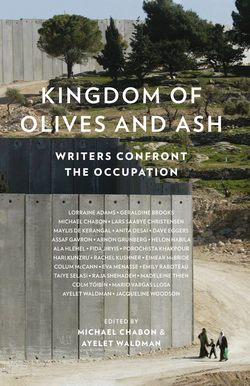Читать книгу Kingdom of Olives and Ash: Writers Confront the Occupation - Colm Toibin, Ayelet Waldman - Страница 21
CITIES AND THE LIVING
Оглавление[The inferno of the living] is what is already here … There are two ways to escape suffering it. The first is easy for many: accept the inferno and become such a part of it that you can no longer see it. The second is risky and demands constant vigilance and apprehension: seek and learn to recognize who and what, in the midst of the inferno, are not the inferno, then make them endure, give them space.
—ITALO CALVINO, Invisible Cities
Before leaving Palestine and Israel in mid-July 2016, I made my way to Palestinian friends in Bethlehem, to a Jewish Israeli friend in Akko, and to Tel Aviv for a gathering of former IDF soldiers who had given testimony on the policies and practices of the army. As I climbed the staircases and walked the chambers of both the visible and invisible worlds, I refused to feel estranged from either the humanity or the despair around me.
Earlier, I had asked Nasser if having children had given him hope or made him more fearful. He had laughed and shaken his head. “Yes, things changed. But I don’t know how to tell you this in English.”
When I pushed him, he said, “My children live in this situation.” The smallness of the word situation and the sorrow of the word children struck me with a terrible force. “I tell them about my Jewish friends,” he continued. “I try to bring in my friends, like Yehuda. He wears a kippa and the children think he’s a settler, and I try to teach them no, he’s not a settler. Inshallah one day I will visit Yehuda in his country and he in my country.”
Shulman writes, “To watch the destruction-self-destruction of an entire world, you need only ordinary eyes and the gift of not looking away.” I try to hold the invisible within the real. The occupation began before I was born, but this numbing of our souls and our reliance on the word intractable: surely this cannot be our apology and our answer.
IN THE OPENING PAGES OF THE UNBEARABLE LIGHTNESS OF BEING, MILAN Kundera considers the idea of eternal return. Would a horrific and bloody war, he wonders, if it recurred in the same way over and over again, be altered in any way? “It will: it will become a solid mass,” Kundera concludes, “permanently protuberant, its inanity irreparable.” But the world as we perceive it, where atrocities or violence occur and are then rinsed from our memories, has also led to its own “profound moral perversity … for in this world everything is pardoned in advance, and everything is cynically permitted.” This cynical relationship with history is one we embrace at our peril.
On one of my last nights in the territory, I watched a group of seventy Jewish diaspora volunteers, Israeli activists, and Issa Amro and Youth Against Settlements, work side by side, attempting to clean up a disused Palestinian-owned warehouse in Hebron. Their aim was to lay the ground for what would be the only cinema for Hebron’s 150,000 Palestinians.
Settlers and police instantly appeared, followed by soldiers, who would momentarily begin arresting the activists for disturbing the peace. Watching the scene unfold, which included the activists’ elated singing of African American spirituals and Hebrew traditional songs, the children of the settlers frowned. They asked aloud, again and again, They’re Jews? Through a translator, I spoke to them, wondering about their names and thoughts. A boy, no older than ten, looked me in the eyes and said, “Fuck you.” But behind him, others watched in consternation, with a pensive fascination. An older woman reminded them, “There were Jews who helped Hitler, too.” “Thank you for building Jewish property,” another called out.
“What do their T-shirts say?” a boy asked.
The words were OCCUPATION IS NOT MY JUDAISM.
One of the activists said to him, “Do you think that occupation can really continue like this?”
The boy looked at us through the fence, his face open in surprise. His confusion was real and profound. “What occupation?”
The very earth we stood on momentarily vanished, rendered invisible.
